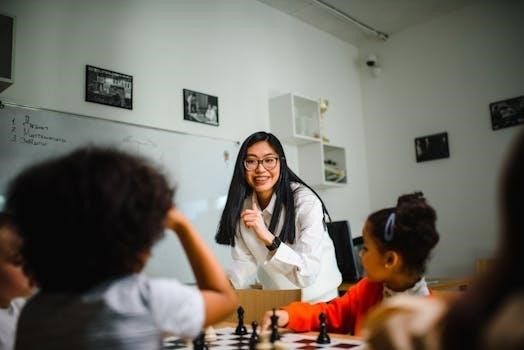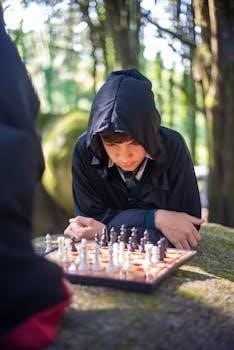ofy unit activity historical thinking skills pdf
The OFY unit activity is designed to cultivate historical thinking skills‚ enabling students to analyze and understand the past. It emphasizes critical analysis and perspective development through engaging exercises. These activities aim to improve analytical skills in a historical context.
Overview of OFY Unit Activity
The OFY unit activity provides a structured approach to learning historical thinking skills. The unit includes a variety of tasks that encourage students to actively engage with historical materials. These tasks range from analyzing primary and secondary sources to examining past predictions about the future. Through these activities‚ students will develop their ability to sequence events chronologically‚ understand causal relationships‚ and use periodization to organize historical information. The OFY unit also focuses on developing critical thinking skills by prompting students to analyze historical context and to form their own informed opinions. The activities are designed to be both challenging and engaging‚ ensuring a meaningful learning experience. The unit’s activities also allow students to practice the detective skills of an historian. It teaches them to observe details‚ analyze evidence‚ and form well-reasoned conclusions about the past. Furthermore‚ students will explore how historical events are shaped by their context. The goal is to foster a deeper understanding of history.
The Importance of Historical Thinking Skills
Historical thinking skills are essential for students to develop a comprehensive understanding of the past. These skills are not just about memorizing dates and facts‚ but rather about understanding how historical events are interconnected and how they continue to influence the present. Historical thinking skills enable students to analyze and interpret primary and secondary sources critically‚ fostering informed decision making. By learning these skills‚ students develop a deeper appreciation for historical context and the complexity of historical narratives. These skills involve chronological reasoning‚ which includes sequencing and dating events accurately. Understanding causal relationships is also a crucial element. Students also practice periodization‚ which involves organizing history into discrete periods. These skills help students see how people’s actions in the past continue to shape our world today. Historical thinking is fundamental for critical thinking development. Additionally‚ it allows for the examination of diverse perspectives and interpretations of the past. These skills are vital for success in all academic disciplines and in everyday life.

Core Historical Thinking Skills Addressed in OFY Unit Activity
The OFY unit activity focuses on core historical thinking skills such as chronological reasoning‚ establishing causal relationships‚ and understanding periodization. These skills are vital for analyzing historical events effectively.
Chronological Reasoning⁚ Sequencing and Dating
Within the OFY unit activity‚ chronological reasoning is a cornerstone‚ emphasizing the importance of sequencing and dating historical events. Sequencing involves arranging events in the order they occurred‚ creating a clear timeline of the past. This skill allows students to understand the flow of history and how one event can lead to another. Dating‚ on the other hand‚ focuses on determining the specific time periods in which events took place. This involves understanding calendars‚ eras‚ and the methods historians use to pinpoint dates. Through these practices‚ students develop the ability to place historical events within a proper timeframe and comprehend their relationships to each other. Accurate dating is crucial for understanding the context of historical occurrences; The OFY activity provides opportunities for students to practice both sequencing and dating‚ enhancing their historical understanding.
Causal Relationships in Historical Events
The OFY unit activity places significant emphasis on understanding causal relationships in historical events. This involves not just knowing what happened‚ but also why it happened. Students are challenged to identify the causes and effects of various historical occurrences. Analyzing causal relationships requires a deep understanding of the context‚ considering multiple factors that might have influenced an event. This skill helps students to recognize that history is rarely the result of a single cause‚ but rather a complex interplay of forces. Through this analysis‚ the OFY activity encourages students to look beyond superficial explanations and delve into the deeper reasons behind historical events‚ fostering a more nuanced understanding of the past. Understanding these relationships allows for better predictions of the future. It also enables students to grasp the interconnectedness of historical occurrences.

Periodization⁚ Organizing History into Discrete Periods
The OFY unit activity also focuses on periodization‚ which is the practice of organizing history into distinct periods. This skill is crucial for understanding how historians structure the past‚ using labels and timelines. Students learn to describe‚ analyze‚ and evaluate different historical periods‚ recognizing the models that historians use to delineate these eras. The activity challenges students to consider the reasons for starting and ending specific periods‚ understanding that these choices are not always objective but reflect certain historical interpretations. It also helps learners understand that these are just models used to better understand the past. Through periodization‚ students develop a deeper appreciation of historical continuity and change over time. They begin to see history not as a continuous flow but as a series of eras with unique characteristics.

Practical Application of OFY Unit Activity
The OFY unit activity promotes practical application through analyzing primary and secondary sources. Students will also examine past predictions‚ developing a broader historical understanding‚ and enhancing critical thinking skills.
Analyzing Primary and Secondary Sources
The OFY unit activity places significant emphasis on the analysis of both primary and secondary sources‚ a core component of historical thinking. Primary sources‚ which are firsthand accounts or artifacts from a specific time period‚ allow students to directly engage with the past. This engagement promotes a deeper understanding of historical events‚ providing direct insights into the perspectives‚ thoughts‚ and experiences of those who lived through them. Students learn to critically evaluate these sources‚ considering their context‚ intended audience‚ and potential biases. This process sharpens their analytical abilities‚ encouraging them to move beyond mere memorization of facts to a more nuanced comprehension of historical realities. Secondary sources‚ which are interpretations of historical events by historians and scholars‚ also form a critical element of the analysis. Students are taught to compare and contrast these secondary accounts with the primary sources‚ assessing the different interpretations and arguments to better understand how narratives are constructed and debated. This practice fosters a critical approach to all information‚ enhancing their ability to analyze differing perspectives and draw their own informed conclusions. This process encourages students to become active participants in the construction of historical knowledge.
Examining Predictions From the Past
The OFY unit activity incorporates the examination of predictions from the past as a unique method to enhance students’ historical thinking skills. By analyzing what people in the past thought about their future‚ students gain a deeper understanding of the historical context and the factors that influenced those predictions. This practice encourages students to consider the assumptions‚ beliefs‚ and biases that were prevalent at different times. Students will analyze various documents and images that predicted the future‚ allowing them to see how people imagined their world might evolve. This activity also allows for reflection on how those predictions aligned with actual historical outcomes‚ which can lead to a more sophisticated understanding of historical change and continuity. This examination allows for an engaging analysis of how social‚ political‚ and technological trends are perceived and projected into the future. Students are also prompted to consider the limitations of predicting future events‚ fostering a more critical and nuanced understanding of both the past and the present. Ultimately‚ this exercise cultivates critical thinking skills.
Developing Historical Perspective
Developing a historical perspective is a crucial component of the OFY unit activity‚ enabling students to understand past events within their respective contexts. This involves moving beyond a present-day view and understanding the social‚ cultural‚ and political norms of different historical periods. Through this activity‚ students learn to appreciate the diverse experiences and viewpoints of people from the past‚ avoiding presentism and biased interpretation. The unit encourages students to examine primary and secondary sources critically‚ considering the author’s background‚ purpose‚ and intended audience. This promotes a more nuanced understanding of historical events and their complexities. Students are guided to recognize that history is not a single‚ monolithic narrative but rather a collection of different interpretations and perspectives. The activity also fosters empathy‚ allowing students to connect with the human experiences of the past. By placing events in their historical context‚ the OFY unit activity helps students develop a more sophisticated and critical understanding of the forces shaping the world. This skill is essential for informed citizenship and for making sense of the present.

Benefits and Outcomes of OFY Unit Activity
The OFY unit activity enhances critical thinking‚ sharpens analytical skills‚ and promotes the application of these skills within a historical context. Students develop a deeper understanding of historical events and their significance.
Enhancing Critical Thinking Abilities
The OFY unit activity significantly boosts critical thinking skills by encouraging students to move beyond rote memorization of facts. Instead‚ it emphasizes analyzing historical sources‚ evaluating different perspectives‚ and constructing well-supported arguments. Students learn to question the information they encounter‚ identify biases‚ and distinguish between primary and secondary sources. Through these activities‚ they develop the ability to assess the reliability of evidence and draw their own conclusions about historical events. This process fosters a deeper understanding of the complexities of the past. Moreover‚ the OFY unit challenges students to think critically about how the past relates to the present‚ fostering a more nuanced and informed view of the world. This ability to critically evaluate information is an invaluable skill‚ not just for historical analysis‚ but for success in academic and real-world situations. The program aims to nurture inquisitive‚ analytical‚ and thoughtful individuals.
Improvement in Analytical Skills
The OFY unit activity fosters substantial improvement in analytical skills by engaging students in a range of tasks that demand careful examination of historical data. Students are trained to dissect complex events‚ identify underlying causes‚ and trace the consequences of actions through close analysis of diverse sources. The activities require students to organize information logically‚ develop coherent arguments‚ and evaluate the validity of claims made by historians and contemporaries. This analytical rigor extends to interpreting maps‚ timelines‚ and other visual representations of historical information. Through this process‚ students learn to distinguish between correlation and causation‚ and consider multiple interpretations of events. This disciplined approach to information analysis empowers them to approach historical study with greater precision. Ultimately‚ the OFY unit’s emphasis on analytical skills prepares students to engage with complex information in all areas of their lives‚ not just historical inquiry. It enhances their ability to assess situations‚ identify patterns‚ and formulate their own informed perspectives.
Application of Skills in Historical Context
The OFY unit activity ensures that the developed historical thinking skills are directly applicable within a historical context. Students are not just learning abstract concepts; they are actively employing these skills to analyze specific historical events‚ periods‚ and issues. This application involves scrutinizing primary and secondary sources‚ constructing chronologies‚ and evaluating causal relationships within historical narratives. The unit encourages students to consider the perspectives of individuals living in different historical periods‚ thus fostering a more nuanced and empathetic understanding of the past. By engaging with historical content in this way‚ students learn how historians construct their interpretations and develop their own historical arguments. They begin to understand that history is not a fixed narrative but rather an ongoing process of interpretation and analysis. Through this practical application‚ they develop a stronger appreciation for the complexity of the past and its relevance to the present‚ enhancing their ability to think critically in a historical context.